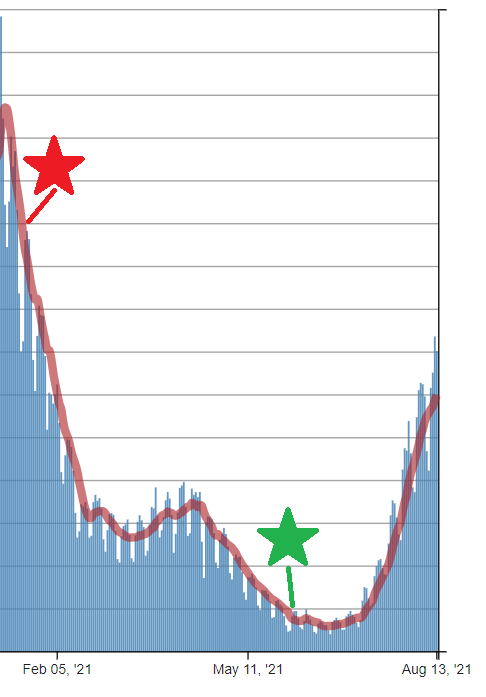I think the thing that has been most surprising to me is how insistent people are about getting vaccinated regardless of whether one has had a case of Covid. When we get the flu shot, they ask if you have had the flu within the past month because it can cause a reaction to receive the vaccine while flu antibodies are active in your system. Perhaps one of you have come across better information, but the explanations about why one needs to be vaccinated even after having a symptomatic case of Covid seem to come down to "we don't know how long the natural immunity will last." This explanation makes me skeptical. Given the motivation to vaccinate as many people as possible, any evidence of natural immunity being less effective than the vaccine would surely be widely published. There are also statements that natural immunity starts to fade after 6-8 months but vaccine immunity lasts a full year. Now we're seeing significant levels of breakthrough infections (vaccinated people testing positive for Covid) [1]. Most of these cases are quite a bit milder, so the vaccines are highly effective at reducing symptoms, but the actual immunity against the variants appears to be reduced compared to earlier results, thus reducing its benefit compared to natural immunity (6 month booster shots are already recommended for high risk individuals).
So, how does the vaccine actually work? The Moderna and Pfiezer vaccines both inject you with messenger RNA. These enter into cells primarily in your arms (though they are known to migrate to other parts of your body as well) and turn the infected cells into factories producing the infamous spike protein. Your bodies' immune system detects the spike protein and develops an immunity to it. In the short term after receiving the vaccine, you have active antibodies in your system. Over time, those antibodies fade, though you retain
T cells that are able to restart the antibody production. On the other hand, when you come down with a case of Covid, your immune system detects the entire virus, not just the spike protein, and it develops an immunity against the whole thing, including spike proteins.
That means that the vaccines train your body to very efficiently attack the spike proteins. Natural immunity results in a reaction to all parts of the virus. Now we enter into the realm of supposition. My guess is that the vaccine immunity results in a much more efficient response to the spike protein than natural immunity, and the spike protein is key part of the virus's ability to cause a symptomatic response. Perhaps that specialized response to a very specific protein lasts longer than a general response to the overall virus. On the other hand, a slight mutation of the virus that causes the spike protein to look a bit different will no longer be as effectively eliminated by a vaccine-based immunity. Whereas an immune response to all parts of the virus can be more effective in such cases.
[1]
https://www.sciencemag.org/news/2021/08 ... feat-deltaIsrael has among the world’s highest levels of vaccination for COVID-19, with 78% of those 12 and older fully vaccinated, the vast majority with the Pfizer vaccine. Yet the country is now logging one of the world’s highest infection rates, with nearly 650 new cases daily per million people. More than half are in fully vaccinated people, underscoring the extraordinary transmissibility of the Delta variant and stoking concerns that the benefits of vaccination ebb over time.








































































































